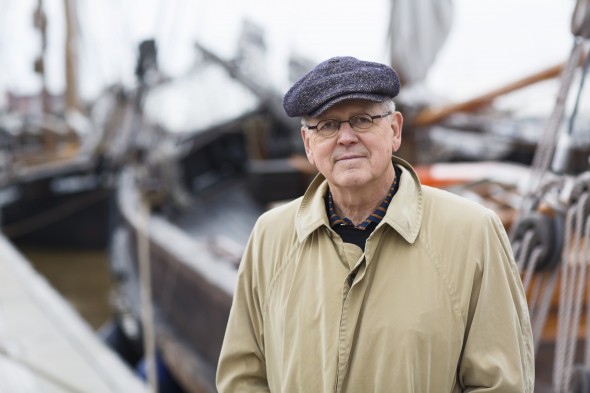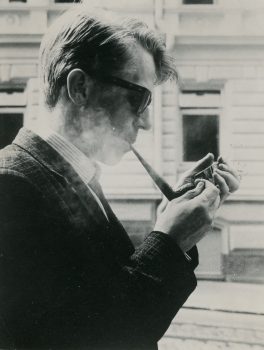Archive for September, 1985
Poems
Issue 3/1985 | Archives online, Fiction, poetry
Introduction by Pertti Lassila
If you come to the land of winds, to the bottom of the sea,
there are few trees, plenty of icy wind
from shore to shore.
You can see far
and see nothing.
Around you screech the newborn plains
still wet from fog
but clear as a dream
at the edge, the sea
beneath, the deep earth
above, the wide expanse
shouts to you and to the plains
about being
it looks at you and asks
When we returned home
and leaned against the long table
we could see the simple grain of the wood
and our weariness turned into knowledge
of why we had had to go away:
to come back to see the uncharted patterns
in the table at home.
From Lakeus (‘The plain’, 1961)
Among the ice floes
Issue 3/1985 | Archives online, Fiction, Prose

Alpo Ruuth. Photo: Sakari Majantie / Tammi
Alpo Ruuth came across the diary of a member of the Finnish crew of ten men in the Whitbread Round-the-World sailboat race of 1981-1982, and Ruuth, a sailor himself, used that diary as the basis for his novel, 158 vuorokautta (‘158 days’, 1983). It is the story of a great adventure which takes place with the help of ultra-modern equipment and yet involves confrontation with elemental nature, the dangerous power of the southern seas. Ruuth does not use the actual names of the crew, but has taken the view of the fictional crew member who is able to offer ironic comments on what he observes. The book portrays the relationships among the crew under the cramped and difficult conditions of the long voyage. As the extract begins the yacht is in the Southern Ocean, close to the Antarctic coast, making its way towards Auckland, New Zealand.
An extract from 158 vuorokautta (‘158 days’)
Around noon we run into a blizzard. On deck they shout down that a wind has got up. Below, we wake hurriedly from our afternoon naps and start pulling on clothes against the tough weather outside. It’s quite a business in our cramped quarters, and every now and then someone loses his footing and falls as the boat pitches. Cursing is the only medicine for bruises. One by one the boys go up to help change sails; at the bottom of the steps there are excesses of politeness: after you, sir; no no, after you. Up they go, all the same. More…
At the sand pit
Issue 3/1985 | Archives online, Fiction, Prose

Antti Tuuri. Photo: Jouni Harala
‘After nearly 40 years of observing the Ostrobothnians, I am convinced that they have certain characteristics which explain the historical events that took place there and which also shed light on the region today. I do not know how these characteristics develop, but it appears that heredity, economic factors and even the landscape form the nature of people. Everywhere people who live in the plains are different from those who dwell in the mountains, and from those who fish the archipelagos,’ writes the author Antti Tuuri, himself an Ostrobothnian.
Antti Tuuri’s Pohjanmaa (‘Ostrobothnia’, 1982), which last January was awarded the Nordic Prize for Literature, has now been translated into each language of the Nordic countries. Tuuri’s novel describes the events of one summer day in Ostrobothnia, on the west coast of Finland, where a farming family, the Hakalas, has gathered for the reading of the will of a grandfather who emigrated to the United States in the 1920s.
The inheritance itself is insignificant, but it has brought together the four grandsons, with their wives and children. The story is narrated from the point of view of one of the brothers. The women of the family remain inside while the men take out an automatic pistol which has been kept hidden away since one of them smuggled it home from the Continuation War. The men go off to a sand pit to do some shooting and to drink some illegal home brew. There they meet their former schoolteacher, who joins in with their drinking and shooting. Some surprising events take place as the day’s action unfolds, and Tuuri’s narrator views them in an unsentimental way, describing them matter-of-factly and at times with ironic humour. The men recall the violent history of Ostrobothnia, the years of the Civil War and the right-wing Lapua movement of the 1930s.
The Nordic Prize jury commented that the novel ‘portrays the breaking up of the old society, and conflicts between generations as well as between men and women.’ Tuuri has constructed his novel on conflicts, and the result is a highly dramatic narrative.
![]()
An extract from Pohjanmaa (‘Ostrobothnia’)
A Finnish hound dog came out of the woods just beyond the sandpit, stopped at the edge of the pit and started to bark at us. The boys quickly began putting the weapon together. Veikko yelled that you were allowed to shoot a dog running loose in the woods out of hunting season. He kept asking me for cartridges; he’d shoot the dog right away, before it could tear to pieces the young game birds that couldn’t fly yet. I told him to shut up. Seppo finished putting the automatic pistol together and gave it to me. I ran to the car, put the gun down on the floor in front of the back seat and tossed a blanket over it.
When I got back, I saw the teacher coming out of the woods over by the pit. He snapped a leash on the dog and started towards us through the pine grove. The boys sat down around the campfire and began taking swigs of home brew from their cups. More…

